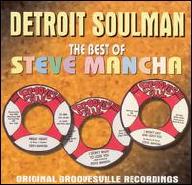After HPC, Fuqua ran Tri Phi and Harvey Records with Gwen Gordy. But when Harvey, formerly of the Moonglows, found Johnny Bristol Jackey Beavers (Johnny Jackey), Two Friends got placed on the back burner. With Motown emerging and Tri Phi and Harvey suffering from diminishing returns, Harvey and Gwen merged with Motown, who got Wilson and Jackson in the deal. If Motown recorded them, either as a group or as solo artists, the tracks were never released. They wrote a few songs that never did much like Number One In Your Heart (the Monitors); all were either buried on albums, served as B-sides, or remain unreleased. Wilson did no better without Jackson, his best effort was Give A Little Love, the B-side of Marvin and Tammi's Ain't No Mountain High Enough.
Neglected, Wilson left Motown in 1965 to work with Don Davis. Davis suggested a name change, Clyde Wilson just wasn't cutting it, and for the rest of his secular recording career he was Steve Mancha. The first Davis' production Did My Baby Call b/w Whirlpool, dropped on Wheelsville Records in 1965. It did O.K. in some markets but wasn't a breakout; years later the Mad Lads did a remake on Volt Records. It was followed by three releases on Groovesville You're Still In My Heart b/w She's So Good (10/65) was the first. Mancha's solo string was interrupted by a Holidays single I'll Love You Forever, on Golden World Records; these Holidays were actually Edwin Starr (lead), Mancha, and J. J. Barnes. It became an R&B hit, but the trio never toured as the Holidays; Davis assembled some more guys for road duty and future recordings. Mancha's next Groovesville single I Don't Want To Lose You, was a beautiful, soulful floater that charted at #34 R&B in 1966; the third Groovesville single Don't Make Me A Story Teller, matched its predecessor by charting #34 R&B in 1967, it was later recorded by the Dells. Davis switched Mancha to his Groove City label for Hate Yourself In The Morning, released March 1968, it wasn't as successful but is just as good as the others. Another solo shot Sweet Baby issued on Groove Records did nothing.
A golden opportunity came via Eddie Holland, Brian Holland, and Lamont Dozier who left Motown around 1967 to start the Invictus/Hot Wax/Music Merchant labels. The Hall-of-Fame songwriters chose Mancha, Joe Stubbs, and Eddie Holiday to front 100 Hundred Proof (Aged In Soul). The hot group imploded on Hotwax with Too Many Cooks (Spoil The Soup) (#28 R&B) in 1969, but the next release Somebody's Been Sleeping, not only set the R&B chart on fire, it went to #8 Pop. As the record simmered on the charts, Mancha hit again, this time as 8th Day with She's Not Just Another Woman, a song he wrote that was the same track on 100 Proof's debut album. As the song exploded, HDH put a group together called 8th Day that featured Steve's friend, Melvin Davis.
100 Proof recorded many memorable recordings including One Man's Leftovers (Is Another Man's Feast), Driveway, 90 Day Freeze, I Rather Fight Than Switch, Everything Good Is Bad, and Don't Scratch Where It Don't Itch. By 1973, however, 100 Proof''s recordings stopped, but was resurrected with new members for a couple of releases in 1977. While 100 Proof was scoring at Hotwax, Don Davis leased Steve Mancha's old tracks to Stax Records which resulted in the Rare Stamps, album on Volt Records which also included recordings by J. J. Barnes; it was later released on CD with an entire Darrell Banks' album added. When HDH moved to California, and Mancha, didn't, his career ended. Stax had gone under, stoned by bankruptcy and payola charges, and Don Davis was steadfastly leaving the music business. He eventually did and once--and may still--owned a bank in Detroit. Mancha's first mentor, Harvey Fuqua was in California too. But for some strange reason, maybe it's a fear of earthquakes, Steve never left the Motor City.
He switched to gospel music but hasn't found the success he enjoyed with secular music, though it's obviously more spiritually fulfilling. Producer, Ian Levine unearthed Steve in 1998 and recorded It's All Over The Grapevine, it became a Northern Soul favorite but did anything in the States. Mancha's more known overseas, even the hits with 100 Proof and 8th Day didn't win him any recognition, 100 Proof wasn't a touring group, they did a few gigs, but most people never saw them; they didn't have an identity beyond their recordings. Steve did a concert in London in year 2000, with Edwin Starr and J. J. Barnes, it was Mancha's first trip across-the-pond. ~ Andrew Hamilton, Rovi












